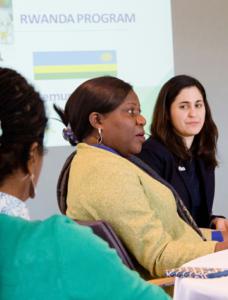Rwandan CRS worker speaks on impact of Rice Bowl donations
BRAINTREE -- The boy was the son of a former perpetrator during the Rwandan genocide, and the girl was the daughter of a genocide survivor. Even so, said Pascasie Musabyemungo of Catholic Relief Services Rwanda, the two "fell in love."
"I cannot believe it myself, although I witnessed it happening... It is something real," said Musabyemungo, who was the project manager for the CRS's Women Building Peace Project Across Borders in Rwanda, at a talk at the Archdiocese of Boston's Pastoral Center in Braintree, March 3.
Her pastoral center visit was just one stop on a speaking tour of the archdiocese to highlight the type of work supported by donations to CRS's Lenten program, CRS Rice Bowl.
An estimated 800,000 Rwandans were killed in the 1994 genocide in a matter of months as one ethic group, Hutu, committed atrocities upon another, Tutsi. Musabyemungo said that time, as well as a number of programs, including one sponsored through a collaboration with CRS and the Rwandan bishops' Justice and Peace Commission, are helping the country heal.
The collaborative program not only helps "educate people on how they can live together," but it also asks perpetrators in the genocide to "repent and seek for forgiveness," and calls on victims to forgive, said Musabyemungo.
In the case of the young couple, it was soon after the girl's mother forgave her perpetrators that the two fell in love.
"Let our next generation live in peace," she reportedly told the boy's family.
Musabyemungo said the couple is now married and have a three-year-old child.
"In this Year of Mercy, I think this is truly what we need to learn -- how far people can move forward to forgive," she said.
During the rest of her talk, Musabyemungo spoke on several of the other ways CRS provides assistance to the people of Rwanda, highlighting the programs for people affected by HIV/ AIDS.
She noted that in her experience, many people affected by HIV/AIDS feel vulnerable and reluctant to get help. However once they sought support, "Catholic Relief Services helped them to recover human dignity."
Musabyemungo talked about one woman who was widowed by AIDS and was left caring for three children with very little food or money. CRS managed to provide her with assistance, including medical support and information on how to manage income.
Through the support of CRS, the woman was able to "feel human" again, and her children now have access to a university education, Musabyemungo said.
Musabyemungo discussed the services CRS provides for pregnant women and new mothers.
CRS advises the women on "preparing a balanced diet," as well as helping the women to begin growing small quantities of produce for themselves.
Musabyemungo explained that the produce can be eaten or turned into juice to feed young children, as well as sold to provide the women with a small income.
"Child malnutrition is at 38 percent in Rwanda," she cited, highlighting the importance of teaching women to grow their own food.
A major source of the support that Musabyemungo and her colleagues receive comes from CRS Rice Bowl, a Lenten program that asks families and communities to help support CRS initiatives.
"This support from the U.S. Catholic community -- through prayers, almsgiving, fasting, and learning -- embodies the spirit of Lent in a tangible way, making us instruments of peace in global solidarity with our brothers and sisters around the world," said Danielle Corea, relationship manager/ university liaison for the Northeast/Mid-Atlantic Region with CRS, in a March 8 statement to The Pilot.
Last year, supporters donated $10 million to the program. $7.5 million of that money sustained projects overseas to support the poor and vulnerable, while $2.5 million went to programs in the United States. Twenty-five percent of each individual's donation stays within their own diocese.



















